OUCH! My puppy won't stop biting!
GOT A PUPPY WHO BITES? Teaching your puppy 'no' to bites
Ooooo those needle teefs! Even when they are tiny, a shark toothed puppy can really hurt.
Bob was a very bitey puppy, and he particularly liked to bite me. Not Gareth so much. He decided I was his biting buddy for some reason!!
Biting and mouthing are natural behaviours that help puppies learn and explore the world, however you should teach some boundaries.

Teaching your puppy not to bite you is an important part of your journey together, as it not only saves your hands and ankles, but it avoids having an adult dog who believes biting people is acceptable.
As a pawrent, it's your job to teach this important life lesson.
THIS IS AN IMPORTANT STEP FOR A PUP
From 8 weeks old puppies will learn to not bite their mother and litter family. If they bite too hard, their brothers and sisters will ‘yelp’, letting the pup know that it hurts. Their mother will stop playing and turn away.

It's very important that when your pup moves to your family that you continue to teach them bite inhibition.
I've put together some tips and tricks to help teach your puppy that you are not a chew and that it's not acceptable to bite.
USE PUPPY TOYS, NOT YOUR HANDS
If you use your hands to push, play and rough-house your pup, they will see your hands as a toy.
Use puppy specific toys instead, like soft Kong rubber toys, natural rope and soft cuddlies.
Take a look at all our puppy toys.
Some useful toys include
- Rope toys, good for teething puppies (if the rope unravels, cut it off and throw away)
- Rubber Kong (see our blog on filling and freezing the Kong)
- Tough, soft toys, some breeds are more destructive than others, so we have a wide range of soft toys, from softy soft for those that don't destroy, through to super tough for the chewers.
If your pup turns out to be a chewer/destroyer of toys, make your purchases last longer by playing together with soft toys, and then putting them out of reach.
For puppies up to 12 weeks, their teeth are still too small and weak for most chews. So, toys and a rubber Kong will be come your best friend!
Take a look at our blog on choosing and using a Kong.
Now you have toys for your puppy to chew on and play with, you can only use your hands for scruffs and tummy rubs!
We also have lots of 100% natural chew options for your puppy. Each item has a age limit, so check what stage your puppy is at.
ALL JR Pet products are suitable for 12 weeks plus, so they are a great way to introduce your pup to chews.
Check out our blog on the top selling JR Pet chews.
If your puppy continues to bite your hand, stop playing, walk away. It's very important to display consistent behaviour, so make sure you stop and leave the situation every time biting starts.
TIME OUT & BOUNDARIES
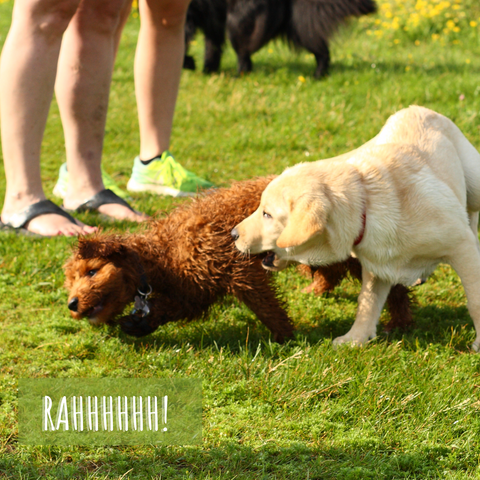
Letting puppies play is absolutely necessary to their development.
However, keep an eye on play and if it gets too rough or excitable, make them take some time out.
This goes for play with other pups, and humans.
If pups start biting you or each other, remove them from the situation until they have calmed down. Then reintroduce pup to the fun.
It's easy for a puppy to get over-excited and a bit crazy!
KNOW WHEN TO STOP
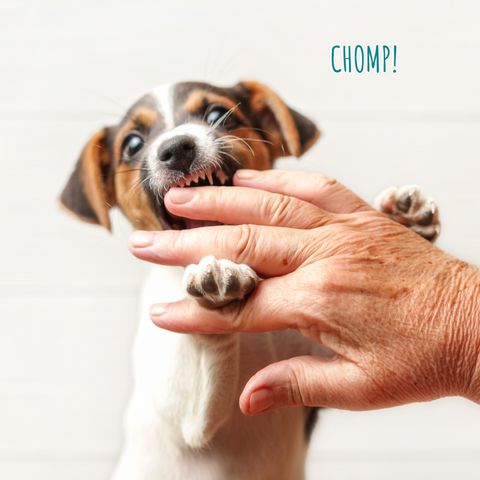
If your puppy is continuously biting you, tuck your hands under your armpits and turn your back. They may continue to jump at you, or bite your ankles or trousers. Try your very best to ignore them.
You want to teach your puppy that hard bites will stop play.
When the moment is over, start playing again, but remember to repeat the stop and turn if they bite too hard.
If the biting really is crazy, remove yourself from the room completely and leave the puppy to calm down. They may yip and cry, but wait until they are quiet before you return.
Setting boundaries and good behaviours isn't cruel, it's hugely important for your dog's well being.
LEARN THE ‘LEAVE IT’ COMMAND
You will no doubt attend some basic puppy training classes, and 'leave it' is one of the commands that you will learn.
It's another absolute must in a doggy bag of tricks, as it not only helps you teach your pup not to bite, but it will become useful when you are out and about. Learning to 'leave it' when they come across a dropped kebab, pile of sheep doodoo or anything else you don't want them to eat, is such a useful skill!
Start practising from young and as always BE CONSISTENT.
Hold a treat in your closed fist. Your pup will try and get the treat, nudging and licking your hand. Say 'leave it'. Wait until they stop trying to get the treat, and release your hand.
Once they get the general idea, you can move on to putting the treat on the floor in front of you. If your pup goes to take the treat, cover it up quickly and say 'leave it'.
This important lesson will take some patience to master, but it's so worth it. Try for a few minutes a day (you don't want to bore your pup or make them frustrated). Over the course of a few weeks you will both learn together.
CONSISTENCY! THE WHOLE FAMILY NEEDS TO KNOW THE RULES
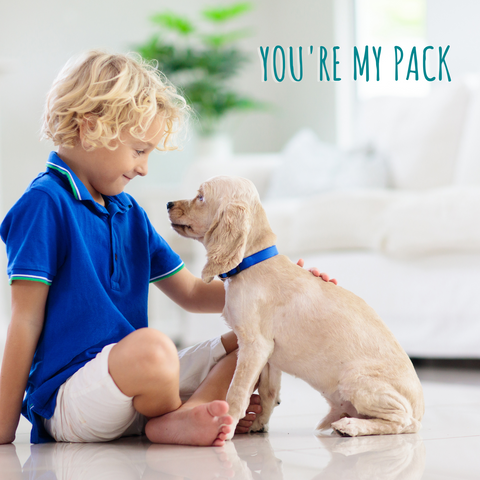
Puppies quite often bite children more than adults, just because they see kids as their litter mates, and they aren't as good at enforcing the boundaries.
To stop your children having a bad time with the pup, make sure you are all trained on how to stop the biting.
The steps are the same, if the biting starts, then remove the child and yourself from the situation and leave the pup alone.
If your child is a little older and able to give commands, make sure they say a sharp (but not loud!) 'no'. Remove their hand from the pup and hide under arm pits. Turn around and ignore the pup.
Repeat. Repeat. Repeat. I've said it before and I will say it until it's boring - you MUST be consistent.
BITES WILL HAPPEN - THEY ARE JUST A BABY
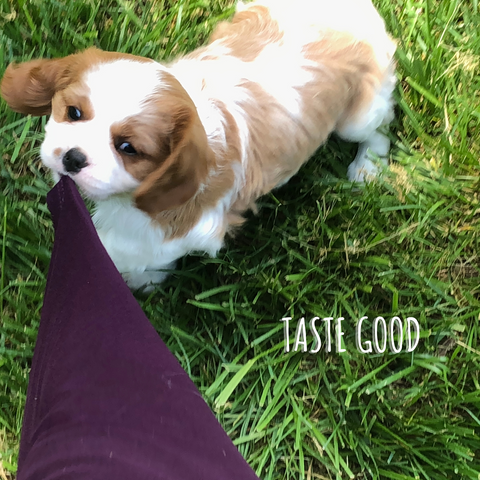
Puppies use their mouth to explore and they may mouth you as a way of bonding.
You can teach your puppy that soft bites and mouthing are okay, but hard bites are not!
Try to be patient at this stage, they are just a baby. Don't shout at them, you don't want a scared puppy. Just walk away if it gets too much for you.
The biting will stop as they grow up, honestly it will. And with your love and guidance they will learn that you (and other people and dogs) are not to be bitten.
WHEN WILL IT STOP?!
Take time to bond and teach your puppy.
Be consistent, with ALL family members behaving the same way.
Puppy shark biting will naturally fade out over the months and particularly after they stop teething. It should stop between 4 and 5 months, but your boundary setting and consistent messages will help enormously.
They are a baby, they will learn and remember - BE CONSISTENT!
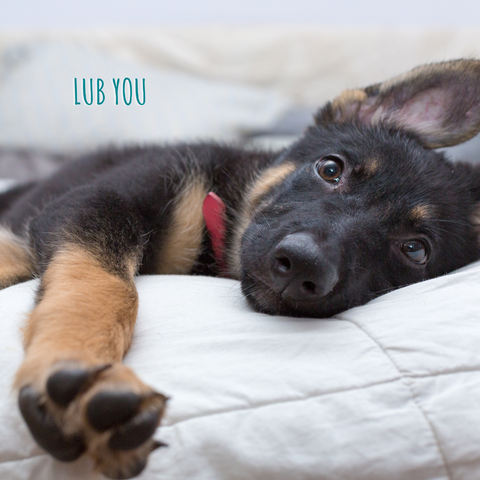



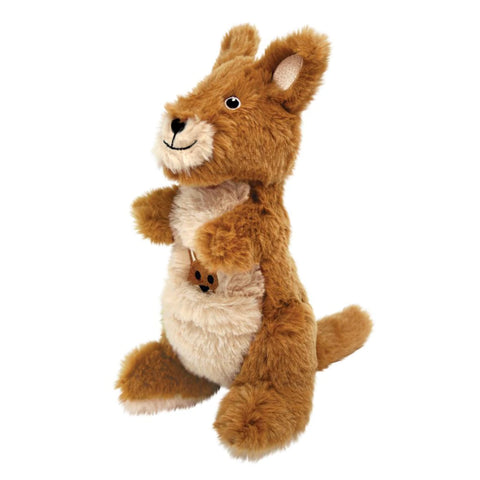
Thank you for this advice. We have a new 9 week old puppy and this is just what we need to know. No more nips action plan starts now!